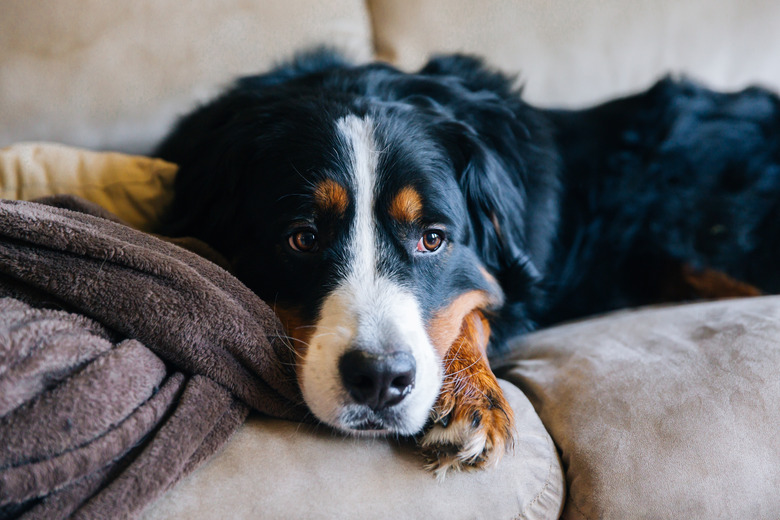Dog Vaccinations Side Effects
You may observe a wide array of side effects after your dog is vaccinated. Some are more dangerous than others and may necessitate immediate veterinary care. Some dog breeds are more prone to side effects than others.
What are the side effects of dog vaccines?
What are the side effects of dog vaccines?
The side effects of vaccines given to dogs range from loss of appetite and excessive sneezing to severe dizziness and disorientation. It's always good to be on the lookout for any adverse reactions for a couple of days after your dog receives a vaccine and seek appropriate care as needed.
Coldlike symptoms after a dog vaccine
Just as humans can sometimes suffer from fever relating to vaccinations, dogs can too. It may be just a low-grade fever that will last a day or so after the vaccination or even just for a few hours. Talk to your veterinarian if this has occurred more than once, and they will be able to assess your dog's risk. They may advise you to give the dog a mild fever reducer to prevent or treat the fever in the future.
Not eating after a dog vaccine
Lack of appetite after receiving a vaccine is also normal. If it lasts longer than a day or two, it might be a serious reaction, and you should take your dog to the veterinarian for a checkup.
Sneezing after a dog vaccine
Sneezing, reverse sneezing, and cold symptoms are normal for a day or two after receiving this type of vaccine. Some vaccinations, such as Bordetella bronchiseptica and parainfluenza, may be administered as an intranasal vaccine spray.
Pain and tenderness after a dog vaccine
One of the most common reactions dogs can have is simply to feel pain at the site of the injection. It may even form a small lump that should dissipate over the next few days to a week. However, it is not unusual for a rabies vaccine to leave a temporary firm bump the size of a quarter that can last for about a month. However, it usually resolves on its own.
Your pooch may feel tenderness and mild discomfort around the area of the injection, so refrain from touching them on this location until the pain has subsided. If they will allow it, you can apply a warm compress to the injection site to help relieve the pain. Perhaps talk with your veterinarian about using a different area for the injection next time to see if this side effect can be avoided or lessened.
What breeds are more prone to vaccine reactions?
What breeds are more prone to vaccine reactions?
Smaller dogs such as dachshunds, pugs, Boston terriers, miniature pinschers, and Chihuahuas have shown to be more prone to adverse vaccination reactions. If your dog is one of those breeds, you may want to discuss concerns regarding any risk of reactions with your veterinarian.
How do you know if your dog is having an allergic reaction to shots?
How do you know if your dog is having an allergic reaction to shots?
Some dogs may have a dangerous reaction to a vaccination, called anaphylaxis, and the side effect can be life-threatening. If you notice any swelling around the dog's face upon leaving the veterinarian's office, be sure to seek immediate attention. They may be having an allergic reaction and will more than likely be given a corticosteroid injection and an antihistamine injection that will reverse the reaction that has occurred from the vaccination. In some cases, epinephrine may be needed.
The following are several dangerous symptoms to keep an eye out for after your dog has been vaccinated.
- Facial swelling
- Hives
- Itchiness
- Nausea
- Vomiting
- Diarrhea
- Collapse
Contact your veterinarian or emergency veterinary clinic immediately if your pet suffers any of these side effects to immunization. If your dog has an allergic reaction to a specific vaccination or medication, it should be avoided and not used again on the dog.
Most pet owners take their dog to the veterinarian for vaccinations and to get their yearly exam. Although some dogs never have issues or problems with the vaccinations, some dogs receive an injection and experience a variety of side effects, such as your dog being lethargic after shots. Most side effects are mild and should subside within 24 hours. The typical dog vaccines include rabies, adenovirus, distemper, parvovirus, and parainfluenza. Depending on where a dog lives and travels, they may also get the leptospirosis vaccine.
What are the risks of a vaccine reaction?
What are the risks of a vaccine reaction?
Severe adverse reactions to vaccines given to dogs range from difficulty breathing to anaphylactic shock. Always pay close attention to your dog's behavior after they receive a vaccine and contact your veterinarian if you suspect any detrimental health issues.
Dog having breathing difficulty after a vaccination
In rare cases, some dogs will develop more severe adverse reactions, such as difficulty breathing. This may occur within minutes or may be delayed for several hours. If you notice your dog is having difficulty breathing, contact your veterinarian for immediate medical attention.
Lethargy after a dog vaccination
Probably the most common side effect of dog vaccinations is the dog becoming lethargic after their visit. It's normal for a dog to become tired and sluggish afterward, and they may sleep for the rest of the afternoon. They may even seem lazy and be less active for the next day or so after the injection has been administered. Although lethargy is normal, it should not exceed longer than one day after arriving home. If your dog is having trouble walking after shots or if the lethargy does not subside, consult with your veterinarian.
Dizziness and disorientation after dog shots
If your dog becomes dizzy and disoriented after a vaccination, you should contact your DVM, as these symptoms are very rare and a cause for concern.. The dog may not be themself, perhaps walking into things, stepping sideways, and possibly falling down. Collapse is a symptom of anaphylactic shock, which is a severe allergic reaction that calls for immediate medical attention. This side effect usually occurs minutes after the vaccine was administered and can be monitored by the DVM. Be sure to watch the dog closely, help them up and down steps if need be, and reassure the dog that you are there. The dog may become anxious over their fuzzy state of mind; therefore, some extra loving may be a good idea for your pet.
The bottom line
The bottom line
Although some dogs leave the veterinarian's office without having any problems with vaccine side effects, some dogs receive an injection and experience a variety of mild symptoms, such as being lethargic. Some side effects can be life-threatening. If you notice swelling around your dog's face or if your dog becomes dizzy or disoriented, seek medical care for your dog immediately.


